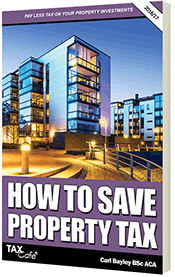Landlord Tax Guide: How to Save Property Tax
How to Save Property Tax
If you are looking for a tax guide for landlords you have come to the right place. Since 2002 Taxcafe has been publishing How to Save Property Tax, widely regarded as the most indispensable tax book for UK landlords.
The author is Carl Bayley, a chartered accountant with over 30 years experience. Carl is a member of the governing council of the Institute of Chartered Accountants in England and Wales (ICAEW). He is also vice-chairman of the Institute's tax faculty.
His landlord tax guide covers all the major taxes landlords face, including stamp duty, income tax and capital gains tax.
The book also contains lots of information for those developing or renovating property.
It's written in plain English and packed with over 100 real-life examples - some of them extremely detailed.
Although the book is written in plain English it does go into tremendous detail. No major tax issue facing landlords is left out.
The focus of the book is tax planning, ie helping you pay less tax while staying within the rules. None of the advice in the book can be construed as aggressive tax avoidance. Everything is tried and tested.
The book is aimed at non-accountants but many accountants and other professionals buy it and use it to advise their clients.
We would definitely recommend reading it before you meet with any accountant to discuss your taxes. Lots of our customers do that.
Chapter 1 - What is Property Tax
In this chapter the guide lists the various taxes landlords face and explains how they are calculated and how to deal with HMRC.
Chapter 2 - What Kind of Investor Are You?
In this chapter the guide explains the difference between the tax treatment of property letting, property development and property trading.
It also explains the tax consequences of owning property jointly with your spouse and property partnerships.
Chapter 3 - Income Tax Basics
This chapter covers things like how landlords income tax is calculated, tax returns, registering a new property business, non-residents, claiming deductions, capital allowances and the new tax relief cap.
Chapter 4 - Saving Income Tax as a Landlord
This chapter explains how you can save income tax. Subjects covered include:
- Interest and Other Finance Costs
- Legal and Professional Fees
- Repairs and Maintenance
- Training and Research
- Capital Allowances for Landlords
- Furnished Lettings
- Rent-a-Room Relief
- Rental Losses on UK Property
- Other Property Investment Income
- Lease Premiums
- Overseas Lettings
- National Insurance on Property Income
Chapter 5 - Property Trading
In this chapter we explain how you can save tax if you are involved in property trading and development.
Chapter 6 - Capital Gains Tax
This is one of the most important chapters of the guide because it explains very clearly how capital gains tax is calculated and what landlords can do to reduce their exposure. Subjects covered include:
- Who Pays Capital Gains Tax?
- CGT Rates
- What is a Capital Gain?
- Spouses and Civil Partners
- Capital Gains Tax Reliefs
- The Principal Private Residence Exemption
- Private Letting Relief
- Landlord Tax Planning with Principal Private Residence Relief
- Gardens and Grounds
- Properties Held in Trust
- Holiday Homes & Second Homes
- Overseas Properties
- Letting Out Part of Your Home
- Using Part of Your Home for Business Purposes
- Entrepreneurs’ Relief
- The Annual Exemption
- When is Capital Gains Tax Payable?
- What Must I Report to HM Revenue & Customs?
- Jointly Held Assets
- Capital Losses
Chapter 7 - Other Taxes Landlords Need to Watch out For
In this chapter we take a look at the other taxes landlords have to know about including stamp duty, VAT, national insurance, mansion taxes and Scottish taxes.Chapter 8 - Advanced Tax Planning for Landlords
This is one of the most useful chapters of the guide and contains a wide selection of tax planning ideas including:
- The Benefits of Joint Ownership
- Using Your Spouse or Civil Partner
- Tax-Free Property Transfers
- Why ‘Let to Buy’ Beats ‘Buy to Let’
- Making the Most of Tax-free Homes
- Main Residence Elections
- Developing Your Home or Garden
- Using Children to Buy Property
- Using a Trust for Extra Principal Private Residence Relief
- Furnished Holiday Lettings
- Tax-Free Holiday Homes
- Entrepreneurs’ Relief on Investment Property
- Enterprise Investment Scheme Shares
- The Seed Enterprise Investment Scheme
- The Benefits and Pitfalls of
Re-Mortgaging (A.K.A. ‘Equity Release’)
- Non-Domiciled Investors
- Using Lease Premiums to Generate Tax-Free Receipts
- Selling a Portfolio Gradually to avoid CGT
- CGT Rollover Relief
- Year End Tax Planning for Landlords
- Using Your Basic Rate Band to Save Capital Gains Tax
- Avoiding the High Income Child Benefit Charge
- Emigration
- Planning for Non-Resident Landlords and Those Intending to Emigrate in the Future
- The General Anti-Abuse Rule






